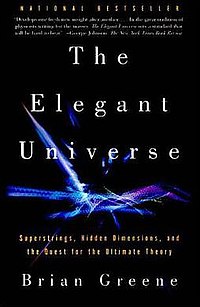
The name of this nonfiction book is The Elegant Universe by Brian Greene. The main focus of the book after the explaining of concepts is through, is more intended toward what a theory with 10+ would imply for our universe. It starts off relatively slow, with an introduction into measuring the size of the universe. Then it gets a little more complicated when it is shown that since we are relatively light particles (photons) to measure the distances, we are only getting half the story. If we were to use particles that weighed a planck mass or more, we would find the true size of the universe to be 10-61m across instead of the 1061m that we see. It then goes into explaining how it could be possible to move through these dimensions as when you hit the edge of one, you should get sent back to the opposite side of the dimension. This would make for some really interesting days, as every minute movement would shoot you back to the beginning. The amazing part of the book is when Brian Greene and his colleagues, Strominger, Aspinwall and Morrison; attempt to settle the unruly possibility of spacial tears. Their solution to a catastrophic spacial rip that could potentially end the universe at any time, was to allow objects called P-branes (spatially extended filaments of matter in P- dimensions) to cover the higher dimensional spacial rips by folding over them, like a cloth over an apple. This would cause the spacial fabric to again contract and form a space-tearing flop transition, which looks like a bow-tie in 3-dimensions (and can be represented in higher dimensions).
So far, this book has been very informative, but also feels very light. It gives the information in an easy to understand, humorous way. I would recommend this book to someone who wants to see the real side of physics. It’s not all chalkboards and paper, Brain Greene lets the reader know how string theory excitingly came to be!